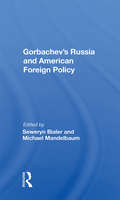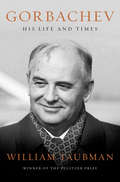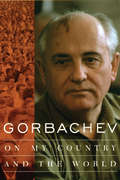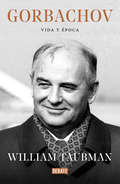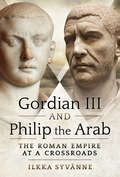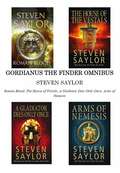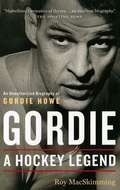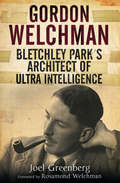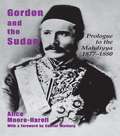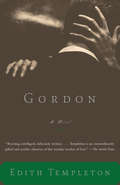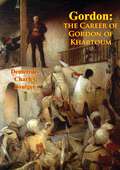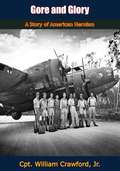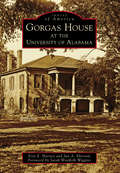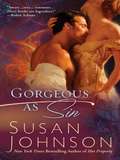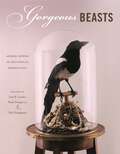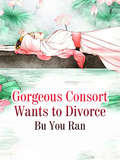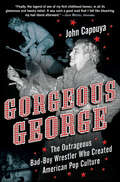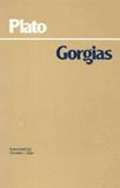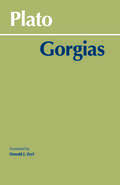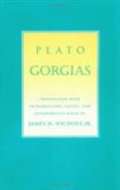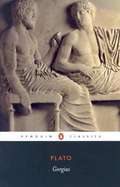- Table View
- List View
Gorbachev's Russia And American Foreign Policy
by Seweryn BialerThe Soviet post-Stalin period is examined in its economic, political, and foreign policy dimensions, stressing the factors that provided the gestation environment for Gorbachev's reforms. There follows an analysis of the nature, sources, and plausible outcomes of Gorbachev's "revolution" and the strategies he is applying to it. A separate part of the book examines the changing goals of past U.S. policies toward the Soviet Union and their effectiveness in influencing Soviet behavior. The final part puts forth suggestions and prescriptions for a U.S.approach to the changes in Soviet economic, security, and foreign policies. The East-West Forum is a New York-based research and policy analysis organization sponsored by the Samuel Bronfman Foundation. Its goal is to bring together experts and policy leaders from differing perspectives and generations to discuss changing patterns of East-West relations. It attempts to formulate long-term analyses and recommendations. In preparing the chapters of this book, the authors drew upon the work of a series of workshops initiated by the Forum.
Gorbachev: His Life And Times
by William TaubmanThe definitive biography of the transformational world leader by the Pulitzer Prize–winning author of Khrushchev. When Mikhail Gorbachev became the leader of the Soviet Union in 1985, the USSR. was one of the world’s two superpowers. By 1989, his liberal policies of perestroika and glasnost had permanently transformed Soviet Communism, and had made enemies of radicals on the right and left. By 1990 he, more than anyone else, had ended the Cold War, and in 1991, after barely escaping from a coup attempt, he unintentionally presided over the collapse of the Soviet Union he had tried to save. In the first comprehensive biography of the final Soviet leader, William Taubman shows how a peasant boy became the Soviet system’s gravedigger, how he clambered to the top of a system designed to keep people like him down, how he found common ground with America’s arch-conservative president Ronald Reagan, and how he permitted the USSR and its East European empire to break apart without using force to preserve them. Throughout, Taubman portrays the many sides of Gorbachev’s unique character that, by Gorbachev’s own admission, make him “difficult to understand.” Was he in fact a truly great leader, or was he brought low in the end by his own shortcomings, as well as by the unyielding forces he faced? Drawing on interviews with Gorbachev himself, transcripts and documents from the Russian archives, and interviews with Kremlin aides and adversaries, as well as foreign leaders, Taubman’s intensely personal portrait extends to Gorbachev’s remarkable marriage to a woman he deeply loved, and to the family that they raised together. Nuanced and poignant, yet unsparing and honest, this sweeping account has all the amplitude of a great Russian novel.
Gorbachev: On My Country and the World
by Mikhail GorbachevHere is the whole sweep of the Soviet experiment and experience as told by its last steward. Drawing on his own experience, rich archival material, and a keen sense of history and politics, Mikhail Gorbachev speaks his mind on a range of subjects concerning Russia's past, present, and future place in the world. Here is Gorbachev on the October Revolution, Gorbachev on the Cold War, and Gorbachev on key figures such as Lenin, Stalin, and Yeltsin. The book begins with a look back at 1917. While noting that tsarist Russia was not as backward as it is often portrayed, Gorbachev argues that the Bolshevik Revolution was inevitable and that it did much to modernize Russia. He strongly argues that the Soviet Union had a positive influence on social policy in the West, while maintaining that the development of socialism was cut short by Stalinist totalitarianism. In the next section, Gorbachev considers the fall of the USSR. What were the goals of perestroika? How did such a vast superpower disintegrate so quickly? From the awakening of ethnic tensions, to the inability of democrats to unite, to his own attempts to reform but preserve the union, Gorbachev retraces those fateful days and explains the origins of Russia's present crisis. But Gorbachev does not just train his critical eye on the past. He lays out a blueprint for where Russia needs to go in the next century, suggesting ways to strengthen the federation and achieve meaningful economic and political reforms. In the final section of the book, Gorbachev examines the "new thinking" in foreign policy that helped to end the Cold War and shows how such approaches could help resolve a range of current crises, including NATO expansion, the role of the UN, the fate of nuclear weapons, and environmental problems.Gorbachev: On My Country and the World reveals the unique vision of a man who was a powerful actor on the world stage and remains a keen observer of Russia's experience in the twentieth century.
Gorbachev: On My Country and the World
by Mikhail GorbachevThe last president of the Soviet Union discusses Communism, the Cold War, and bringing democracy to Russia in this sweeping political memoir. Drawing on his own experience and rich archival material, Mikhail Gorbachev shares his illuminating perspective on Russia's past, present, and future place in the world. Beginning with the October Revolution of 1917, he notes how much Vladimir Lenin and the Bolshevik Party did to modernize Russia. While he argues that the Soviet Union had a positive influence on social policy in the West, Gorbachev maintains that this positive development was cut short by Stalinist totalitarianism. Discussing the fall of the USSR in depth, Gorbachev examines the goals of perestroika, awakening ethnic tensions, the inability of democrats to unite, and his own attempts to preserve the union through reform. In retracing those fateful days, he explains the origins of Russia's present crisis. He then lays out a blueprint for Russia&’s future, charting a path toward meaningful economic and political reforms. He also presents possible resolutions to a number of international dilemmas, including NATO expansion, the role of the UN, the fate of nuclear weapons, and environmental problems
Gorbachov: Vida y época
by William TaubmanLa biografía definitiva del líder que transformó el mundo, narrada por el Premio Pulitzer, William Taubman. Cuando Mijaíl Gorbachov se convirtió en el líder de la Unión Soviética en 1985 la URSS era sin duda una de las dos superpotencias mundiales de aquel entonces. Cuatro años más tarde, la perestroika y la glásnost, máximos exponentes de sus políticas liberales, habían conseguido transformar profundamente el comunismo soviético, lo que le granjeó enemigos de todo el espectro político. Para 1991, gracias a Gorbachov más que a ningún otro dirigente, la Guerra Fría tocaba a su fin y, escapándose por los pelos de un intento de golpe de Estado, el presidente de la URSS asistía al colapso de una Unión Soviética que siempre había intentado salvar. En la primera biografía exhaustiva del último gran líder soviético, William Taubman nos invita a descubrir cómo un joven hijo de campesinos se convertiría enel artífice del desmantelamiento del sistema soviético, cómo ascendería a la cumbre de un régimen diseñado para mantener a la gente como él sometida, cómo encontraría un terreno común con el presidente Ronald Reagan, y cómo permitiría que la URSS y su imperio se desmoronaran. A lo largo de estas páginas, Taubman nos perfila todas las facetas de un personaje único y, en palabras del propio Gorbachov, de «difícil comprensión». ¿Fue en realidad un líder excepcional o solo un personaje que finalmente cayó por sus propias deficiencias, así como por el destino al que se enfrentó? Basándose en entrevistas con Gorbachov, transcripciones y documentos de los archivos rusos, conversaciones tanto con miembros del Kremlin como con sus enemigos más destacados, por no mencionar a los líderes extranjeros, William Taubman nos ofrece en esta monumental biografía un retrato íntimo y honesto, conmovedor y punzante, pero severo, de un personaje cuyavida podría situarse a la altura de una gran novela rusa. Reseñas:«Gorbachov, como su Khrushchev, es un logro extraordinario. [...] Repleto de nueva información y juicios perspicaces; un doble triunfo para el recuento de grandes vidas.»John Lewis Gaddis, ganador del Premio Pulitzer «Magistral. [...] Será por mucho tiempo la biografía definitiva de esta intrigante figura.»The New York Times Book Review «Esta es una lectura esencial para el siglo xxi.»The New York Times «Taubman aplica una lupa tolstoiana a la historia reciente de Rusia y despliega una particular sensibilidad al analizar una vida que demostraría ser más rica que la política.»The Economist «Una penetrante historia y un fascinante estudio psicológico.»Foreign Affairs Magazine «Magnífico e iluminador. [...] Con gran habilidadTaubman deja al descubierto la transformación personal de Gorbachov, fundamental para entender sus últimas decisiones.»The Washington Post «Adictivo. [...] Un maravilloso y conmovedor retrato de uno de los líderes más importantes de Rusia.»Library Journal «Definitiva.»Publishers Weekly «Una investigación fenomenal sobre la vida del hombre que contribuyó más que cualquier otro a cambiar Europa y el mundo a finales del siglo xx.»The Guardian
Gordian III and Philip the Arab: The Roman Empire at a Crossroads
by Ilkka SyvänneThis is a dual biography of the emperors Marcus Antonius Gordianus (‘Gordian III’, reigned 238-244) and Marcus Julius Philippus Augustus (‘Philip the Arab’, reigned 244-249), focusing mainly on the political and military events during this crucial stage of the ‘Third Century Crisis’. The tumultuous 'Year of the Six Emperors' saw Gordian raised to the purple at just thirteen years of age, becoming the youngest emperor in the Empire’s history at a time when the borders were threatened by the powerful Sassanid Persians and the Goths, among others. Gordian died on a campaign against the Persians, either in battle or possibly murdered by his own men. Philip, succeeded Gordian, made peace with Shapur I and returned to Italy. His reign encompassed the spectacular celebration of Rome’s millennium in 248 but the wars in the Balkans and East together with crippling taxation led to mutinies and rebellions. Philip and his brother had until then fought successfully against the Persians and others but this did not save Philip, who was killed by a usurper’s forces at the Battle of Verona in 249. He had been Rome’s first Christian emperor and the author considers why it was fifty years before she had another.
Gordianus The Finder Omnibus (Books 1-4)
by Steven SaylorROMAN BLOODA thrilling puzzle from the ancient world with real historical characters and based on a case in Cicero's Orations - Roman Blood is a perfect blend of mystery and history by a brilliant storyteller. On an unseasonably warm spring morning in 80BC, Gordianus the Finder is summoned to the house of Cicero, a young advocate and orator preparing his first important case. His client is Umbrian landowner, Sextus Roscius, accused of the unforgivable: the murder of his own father. Gordianus agrees to investigate the crime - in a society fire with deceit, betrayl and conspiracy, where neither citizen nor slave can be trusted to speak the truth. But even Gordianus is not prepared for the spectacularly dangerous fireworks that attend the resolution of this ugly, delicate case...HOUSE OF THE VESTALSWonderfully entertaining mystery stories set in the world of the acclaimed ROMA SUB ROSA series. It is the Rome of the Late Republic, and Gordianus the Finder has a knack for finding trouble - and dead bodies. Known to many as the one man in the ancient world who can both keep a secret and uncover one, Gordianus lays bare some of his most intriguing adventures in this new volume in Steven Saylor's highly acclaimed mystery series. In 'Little Caesar and the Pirates', Gordianus must act as a go-between for kidnappers, but he begins to wonder who is really being held hostage; in 'The Alexandrian Cat', a mischievous girl and a tell-tale sneeze reveal an ingenious plot of murder and thievery; and in 'The House of the Vestals', blackmail goes horribly wrong and there is no one to take the blame. The result is an engrossing collection of finely wrought mystery tales with all the suspense and craft that are the trademark of Saylor's work.A GLADIATOR DIES ONLY ONCEGordianus the Finder, famed detective of Ancient Rome, returns in a riveting of stories. Nine tales of murder and intrigue take him from the seamy streets of Rome to elegant villas on the Bay of Naples, from the spectacular backdrop of a chariot race to a domestic dispute with his Egyptian concubine Bethesda.In the title story a beautiful Nubian actress begs Gordianus to solve an impossible problem: how can she have just seen her beloved brother in the market place when she had previously watched him die a gruesome death as a gladiator?ARMS OF NEMESISSouth of Rome on the Gulf of Puteoli stands the splendid villa of Marcus Crassus, Rome's wealthiest citizen. When the estate overseer is murdered, Crasus concludes that the deed was done by two missing slaves, who have probably run off to join the Spartacus Slave Revolt. Unless they are found within five days, Crassus vows to massacre his remaining ninety-nine slaves.To Gordianus the Finder falls the fateful task of resolving this riddle from Hades. In a house filled with secrets, the truth is slow to emerge and Gordianus realizes that the labyrinthine path he has chosen just may lead to his own destruction.
Gordie: A Hockey Legend
by Roy MacSkimmingThe author of Cold War shoots and scores with the only full-length biography to cover the entire playing career of the Red Wings&’ superstar. Before Gretzky, before Russians played in the National Hockey League, before multimillion-dollar salaries, there was Gordie Howe: the greatest star ever to play hockey. This richly illustrated, thoroughly researched and completely unauthorized biography takes readers behind the sports icon to reveal a man who remains immensely popular with young and old. The Howe legend begins on the frozen sloughs of Saskatchewan, where a painfully shy boy from a poverty-ridden family discovered his one advantage in life: major athletic talent. Signed by the Detroit Red Wings at 16, Howe joined celebrated teammates Sid Abel, Ted Lindsay, Terry Sawchuk and Red Kelly to forge a team that dominated the NHL as only the Montreal Canadiens and Edmonton Oilers have since. Six-time leading scorer, six-time Hart Trophy winner as the most valuable player, Howe surpassed Rocket Richard&’s NHL goals record to reach an amazing total of 801, unmatched for years until finally Gretzky caught up to his mentor and idol. &“Far superior to the hero-worshiping, gee-whiz, then-we-played, ghostwritten autobiographies so popular today . . . Must reading for hockey fans.&” —Booklist &“A very impressive book . . . thoughtful, well-written and marvelously evocative of the era when the NHL had only six teams and the Red Wings were one of the best . . . an excellent biography.&” —The Sporting News
Gordon Welchman: Bletchley Park's Architect Of Ultra Intelligence
by Joel GreenbergA magnificent biography which finally provides recognition to one of Bletchley’s and Britain’s lost heroes Michael Smith. The Official Secrets Act and the passing of time have prevented the Bletchley Park story from being told by many of its key participants. Here at last is a book which allows some of them to speak for the first time. Gordon Welchman was one of the Park’s most important figures. Like Turing, his pioneering work was fundamental to the success of Bletchley Park and helped pave the way for the birth of the digital age. Yet, his story is largely unknown to many. His book, The Hut Six Story, was the first to reveal not only how they broke the codes, but how it was done on an industrial scale. Its publication created such a stir in GCHQ and the NSA that Welchman was forbidden to discuss the book or his wartime work with the media. In order to finally set the record straight, Bletchley Park historian and tour guide Joel Greenberg has drawn on Welchman’s personal papers and correspondence with wartime colleagues which lay undisturbed in his son’s loft for many years. Packed with fascinating new insights, including Welchman’s thoughts on key Bletchley figures and the development of the Bombe machine, this is essential reading for anyone interested in the clandestine activities at Bletchley Park. As seen in the Kent and Sussex Courier, Dover Express, Folkestone Herald, Sevenoaks Chronicle, M.K. Pulse Magazine, The Vine Magazine and Vale Life Magazine.
Gordon and the Sudan: Prologue to the Mahdiyya 1877-1880
by Alice Moore-HarellThis is a study on the period preceding the Mahdist revolution in the Sudan. It analyses the administration and political developments under the governor-generalship of Gordon.
Gordon: A Novel (Vintage International)
by Edith TempletonLouisa is a clever, self-reliant woman who has just been discharged from her duty as an officer in the British Army during World War II. In a London pub one afternoon she meets Gordon: a slight, peculiar psychiatrist with queer eyes and a strange charisma. Within an hour, Louisa has been sexually conquered by him on a garden bench. So begins an affair in which Gordon compulsively violates Louisa's body and psyche, while Louisa matches his onslaughts with an insolent submission. As their entanglement deepens, Louisa finds a heady emotional satisfaction beneath the humiliation that Gordon inflicts, and comes to a new understanding of her troubled history and the self that has emerged from it. Originally published under a pseudonym in 1966, Gordon was banned in England and Germany for its frank sexual content, and even today it remains provocative in its fearless probing of the boundaries of consent and submission.
Gordon: the Career of Gordon of Khartoum
by Demetrius Charles Boulger“A great British soldierThis is the biography of one of the most famous soldiers of the Victorian age—Major-General Charles Gordon. Certainly he is now known as Gordon of Khartoum, but highly regarded in his own lifetime, he was to many also Chinese Gordon and Gordon Pasha. Commissioned as a Royal Engineer, Gordon first saw action during the Crimean War taking part in the siege of Sebastopol, the assault on the Redan and the expedition to Kinburn. In 1860 the Second Opium War broke out in China and it was here and during the Taiping Rebellion that Gordon earned his reputation and the recognition that set him towards high military rank. But it was Africa where he achieved his greatest fame. Gordon was engaged in much vital and interesting service before he found himself behind the walls of Khartoum in an unequal struggle against the religious fervour of the Mahdist forces. This is a thorough account of the man and his times which will be of great interest to those who wish to learn more about Gordon than just his martyrdom in the Sudan.”-Print ed.
Gore and Glory: A Story of American Heroism
by Cpt. William Crawford Jr.“This daring pilot’s narrative is a straight-forward account of his exploits and experiences in the far-flung Pacific, spellbinding in its drama, pathos and breath-taking thrills. May it inspire many others to follow in his footsteps.“Gore and Glory is the story of Young America...out to do or die.”—CHARLES WAYNE KERWOOD, Lieut.-Colonel, Chief Special Liaison Section, United States Army Air ForceFirst published in 1944, this is the true story of Captain William Crawford, Jr. and his graphic experiences as a United States Army Air Force pilot of a Flying Fortress during World War II in the Pacific, the battle of the Bismarck Sea, the assault on Rabaul, and the Papuan campaign in New Guinea, among others.Richly illustrated throughout with photographs.An unmissable World War II aviation read.
Gorgas House at the University of Alabama (Images of America)
by Jun A. Ebersole Sarah Woolfolk Wiggins Erin E. HarneyBuilt in 1829, the Gorgas House is the oldest structure on the University of Alabama campus. Originally constructed to serve as a hotel, housing for the university steward, and student dining hall, the building underwent several renovations to meet the needs of an ever-changing and growing campus. Later utilized as a faculty residence, classroom, post office, and infirmary, the Gorgas House was one of the few buildings to survive the destruction of campus near the end of the Civil War. Standing as a lasting reminder of the university's antebellum past, the house is preserved today as a museum dedicated to the legacy of the building's final residents, the Gorgas family.
Gorgeous As Sin
by Susan JohnsonAn erotic romance star who ?TAKES SENSUALITY TO THE EDGE? (OAKLAND PRESS) debuts her new historical romance trilogy.Fitz Monckton, Duke of Groveland, has never encountered a woman he can?t seduce?until he clashes with the beautiful Rosalind St. Vincent, whose bookshop sits in the way of Fitz?s lucrative development deal. If money won?t entice Rosalind to sell her shop, Fitz must tempt her in other ways?hopefully mutually pleasurable, and profitable to them both.
Gorgeous Beasts: Animal Bodies in Historical Perspective (Animalibus)
by Paula Young Lee Joan B. Landes Paul YoungquistGorgeous Beasts takes a fresh look at the place of animals in history and art. Refusing the traditional subordination of animals to humans, the essays gathered here examine a rich variety of ways animals contribute to culture: as living things, as scientific specimens, as food, weapons, tropes, and occasions for thought and creativity. History and culture set the terms for this inquiry. As history changes, so do the ways animals participate in culture. Gorgeous Beasts offers a series of discontinuous but probing studies of the forms their participation takes. This collection presents the work of a wide range of scholars, critics, and thinkers from diverse disciplines: philosophy, literature, history, geography, economics, art history, cultural studies, and the visual arts. By approaching animals from such different perspectives, these essays broaden the scope of animal studies to include specialists and nonspecialists alike, inviting readers from all backgrounds to consider the place of animals in history and art. Combining provocative critical insights with arresting visual imagery, Gorgeous Beasts advances a challenging new appreciation of animals as co-inhabitants and co-creators of culture.Aside from the editors, the contributors are Dean Bavington, Ron Broglio, Mark Dion, Erica Fudge, Cecilia Novero, Harriet Ritvo, Nigel Rothfels, Sajay Samuel, and Pierre Serna.
Gorgeous Beasts: Animal Bodies in Historical Perspective (Animalibus: Of Animals and Cultures #2)
by Paula Young Lee Joan B. Landes Paul YoungquistGorgeous Beasts takes a fresh look at the place of animals in history and art. Refusing the traditional subordination of animals to humans, the essays gathered here examine a rich variety of ways animals contribute to culture: as living things, as scientific specimens, as food, weapons, tropes, and occasions for thought and creativity. History and culture set the terms for this inquiry. As history changes, so do the ways animals participate in culture. Gorgeous Beasts offers a series of discontinuous but probing studies of the forms their participation takes. This collection presents the work of a wide range of scholars, critics, and thinkers from diverse disciplines: philosophy, literature, history, geography, economics, art history, cultural studies, and the visual arts. By approaching animals from such different perspectives, these essays broaden the scope of animal studies to include specialists and nonspecialists alike, inviting readers from all backgrounds to consider the place of animals in history and art. Combining provocative critical insights with arresting visual imagery, Gorgeous Beasts advances a challenging new appreciation of animals as co-inhabitants and co-creators of culture.Aside from the editors, the contributors are Dean Bavington, Ron Broglio, Mark Dion, Erica Fudge, Cecilia Novero, Harriet Ritvo, Nigel Rothfels, Sajay Samuel, and Pierre Serna.
Gorgeous Consort Wants to Divorce: Volume 8 (Volume 8 #8)
by Bu YouranThe moment he crossed over, he almost died because of a bowl of heart blood!What made things even more difficult was that the dregs Bai Lianqi went up to battle and tortured her, even trying to turn her into a pharmacist to treat the white lotus.Damn it! If a tiger doesn't show off its might, then this old lady is really a sick cat!He treated scum men and abused white lotuses, letting them know why flowers were so red with every step he took.However...What the hell was this prince, who crawled on the bed every night and pressed down on his body?
Gorgeous Consort Wants to Divorce: Volume 9 (Volume 9 #9)
by Bu YouranThe moment he crossed over, he almost died because of a bowl of heart blood!What made things even more difficult was that the dregs Bai Lianqi went up to battle and tortured her, even trying to turn her into a pharmacist to treat the white lotus.Damn it! If a tiger doesn't show off its might, then this old lady is really a sick cat!He treated scum men and abused white lotuses, letting them know why flowers were so red with every step he took.However...What the hell was this prince, who crawled on the bed every night and pressed down on his body?
Gorgeous George: The Outrageous Bad-Boy Wrestler Who Created American Pop Culture
by John Capouya“Finally, the tawdry but glamorous details behind the legend of one of my first childhood heroes. Gorgeous George is such a good read I felt like bleaching my hair afterwards.” — John Waters“Capouya’s biography vividly re-creates Gorgeous George’s antics and the world in which he had more shock value than a numerically named wideout could hope for today.” — Sports Illustrated“Compelling. . . . The tension between George’s excess and his era’s reserve is one of many in his story, and those are what make Capouya’s cultural anthropology so interesting.” — Newsweek“Terrifically, tantalizingly weird. . . . GORGEOUS GEORGE does leave the words of one long-ago sports reporter ringing in your ears: ‘Oh, my, what a strut. If only this man had been born in the barnyard. What a rooster he would have made.’” — New York Times“...[Capouya] delivers a solid, entertaining book about a long-forgotten character and a peculiar slice of American history.” — Entertainment Weekly“Capouya vividly portrays the ins and outs of wrestling and [Wagner’s] own struggle to maintain the ‘Gorgeousness’ of a public life in his private life as well.” — Publishers Weekly“In GORGEOUS GEORGE, Capouya combines extensive research and interviews with a colorful writing style and presents Gorgeous George as a cultural pioneer...Capouya’s words are as fast-paced as the action in the ring and connect with the reader as solidly as a dropkick to George’s kisser.” — Tampa Tribune“Compulsively entertaining...” — Penthouse“You see the title of John Capouya’s biography of Gorgeous George - which claims the flamboyant wrestler “created pop culture” - and you are struck by its audacity. A wrestler responsible for something that important? Impossible. But as you go through the pages, you can’t help but agree.” — New York Post“Gorgeous George invented a style of showmanship that was imitated by entertainers and athletes. With this biography, John Capouya has done an excellent job in introducing the most inventive of sport’s anti-heroes to a new generation of readers.” — Ishmael Reed (novelist, poet, and cultural critic)NO DOUBT OF IT: GEE GEE’S THE BIGGEST THING IN TV — Washington Post, 1949“I don’t know if I was made for television, or television was made for me.” — Gorgeous George“Liberace stole my entire act, including the candelabra!” — Gorgeous George“One can explain the American condition as an eternal, televised battle between the Babyface and the Heel. That said, there’s never been a heel like Gorgeous George. John Capouya has done a fine job here, excavating a forgotten life and explaining why it mattered.” — Mark Kriegel, author of Pistol: The Life of Pete Maravich; National Columnist for FOXSports.com“Like the man himself, this inside look at a legendary performer challenges the reader to think beyond the wrestling ring. We give it four suplexes out of five.” — Pro Wrestling Illustrated“Former Newsweek editor John Capouya reveals the gory underworld of pre-WWE wrestling and shows how the Gorgeous One inspired James Brown, who loved George’s robes, and Muhammad Ali, whose “I am the prettiest” echoed the wrestler’s own vainglorious boasts.” — Los Angeles Magazine“As a show-biz bio and, for those who subscribe to a loose definition of sport, a sports bio, too, this is great stuff, entertaining and well referenced.” — Booklist
Gorgias
by Plato Donald J. Zeyl"This is an excellent translation. It achieves a very high standard of accuracy and readability, two goals very difficult to attain in combination when it comes to such a master of prose and philosophical argument as Plato. Because of this the book is suitable for courses at all levels in philosophy, from introductory courses on Plato, or problems in Philosophy, to graduate seminars. " -- Gerasimos Santas, Teaching Philosophy
Gorgias
by Plato Donald J. ZeylThis is an excellent translation. It achieves a very high standard of accuracy and readability, two goals very difficult to attain in combination when it comes to such a master of prose and philosophical argument as Plato. Because of this the book is suitable for courses at all levels in philosophy, from introductory courses on Plato, or problems in Philosophy, to graduate seminars. --Gerasimos Santas, Teaching Philosophy
Gorgias (Agora Editions Ser.)
by Plato James H. NicholsOne of Plato's most widely read dialogues, Gorgias treats the temptations of worldly success and the rewards of the genuinely moral life. Appealing to philosophers as a classic text of moral philosophy--and to everyone for its vividness, clarity, and occassional bitter humor--this new translation is accompanied by explanatory notes and an illuminating and accessible introduction.
Gorgias (Penguin Classics)
by PlatoTaking the form of a dialogue between Socrates, Gorgias, Polus and Callicles, Gorgias debates perennial questions about the nature of government and those who aspire to public office. Are high moral standards essential or should we give our preference to the pragmatist who gets things done or negotiates successfully? Should individuals be motivated by a desire for personal power and prestige, or genuine concern for the moral betterment of the citizens.
